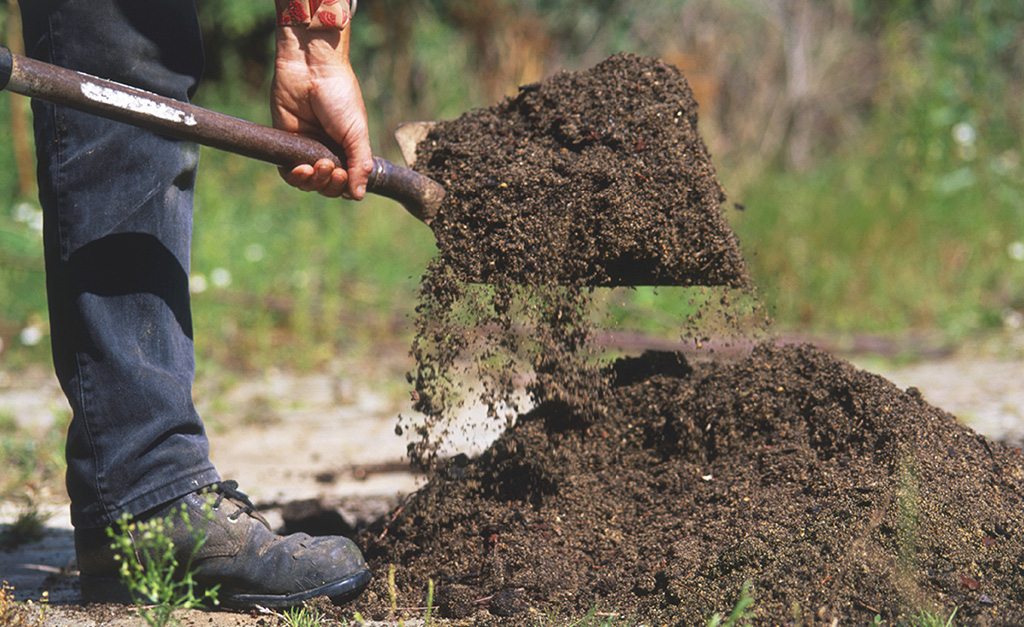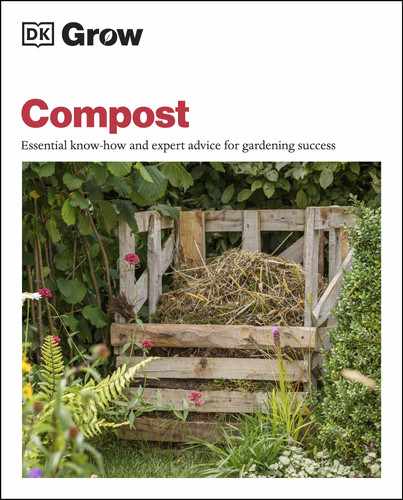Using animal manures
For thousands of years, animal manures have been used to improve soil fertility and boost crop production. The dung from livestock, horses, and even domesticated pigeons is all useful and provides a rich source of nitrogen that helps to activate the microbe decomposers when it is added to a compost heap. Many gardeners also use manures to bulk up their own plant-based materials to create enough ingredients for a hot bin. Alternatively, you can combine animal dung with straw and compost it separately to make a slow-release fertilizer and soil conditioner.
The benefits of manures
Animal manures have many benefits for the home gardener and were the main source of extra food for plants until chemical fertilizers were introduced in the early 20th century. While animal manures contain some nutrients, such as phosphorous and potassium, in smaller quantities than most garden compost mixes, they behave in a similar way when applied to the soil, delivering their goodness slowly over time and allowing plants to take up the food when it is needed.
Fresh manure can burn plant roots and it is generally only used as a mulch on soil in autumn, where it will break down over winter and early spring before the planting season starts. Well-rotted manure helps to build stable soils that hold water well, while allowing excess moisture to drain away easily. When manures are used in a compost heap, their high nitrogen content feeds microbes and can help to speed up the decomposition process; the addition of poultry or pigeon manure is often recommended to kick-start a sluggish heap.

Horse manure contains the perfect balance of plant nutrients.

Well-rotted animal manures will boost the nitrogen content of your compost heap.
Words of warning
Not all manures will deliver benefits to your soil and plants. Never use feces from cats and dogs, which have few plant nutrients and may contain pathogens. The safety of other manures can be compromised if used fresh and if they are not sourced from certified organic farms and stables. To prevent products contaminated with herbicides from killing your plants and crops, ask your supplier if they can guarantee that their animals have been fed on crops grown organically and that these harmful chemicals have not been used on any straw mixed with the manure.
Pig and other animal manures may contain parasites such as roundworms, although the risk is relatively low where they have been acquired from a reliable source with a good animal husbandry record. There is also a slight risk that manures will be contaminated with diseases such as E. coli and salmonella, and fresh manures should never be used on edible crops that will be eaten raw. To prevent these problems and make manure safe, compost it before use. Composting also reduces the high levels of nitrogen in fresh manure which can burn plant roots when it is applied directly to the soil.
Using too much manure on your garden can lead to an excess of nutrients that have not been taken up by your plants leaching into the groundwater and polluting waterways. To avoid this, do not apply large quantities to the soil in autumn.

Pig manure may contain parasites if the animals are not well cared for.
Composting Know-How | USING ANIMAL MANURES
CHOOSING MANURES
Cow, sheep, goat, horse, and poultry manures are the safest choices for the home gardener—those from horses, sheep, and goats contain the best balance of the main plant nutrients. Poultry and pigeon manures are very high in nitrogen and should only be added to a compost heap in very small quantities. Use manure sourced from domesticated pigeons; if you do not own any, ask friends who keep them if they can spare some used bedding, but never collect wild pigeon manure, which may contain dangerous pathogens.

Keeping your own chickens will provide a source of valuable manure.
Using manures
Unless your supplier can guarantee that their products are well-rotted, stack manure and straw mixes under a tarp or similar waterproof material in a corner of the garden to decompose for at least six months (or longer if stacked over winter). The manure will undergo the same composting process as your heap, heating up quickly and then cooling down. If it fails to heat up, add some more straw or cardboard, which will increase the carbon content and introduce more air into the mix. Rotted manure is safe to use as a mulch or in potting mixes instead of compost when it smells sweet.
Alternatively, add thin layers of fresh or rotted manure to your compost heap to provide a nitrogen fix for the decomposers. Remember to wear gloves when handling fresh manure and wash your hands thoroughly after applying well-rotted dung.
TOP TIP Make a hotbed for tender crops, such as tomatoes, using a pile of composting manure covered with a 4–6in (10–15cm) layer of rotted garden compost. The fresh dung mix will heat up and then cool down to below 77°F (25°C), at which point you can plant into the compost on top.

Stack fresh manure mixed with straw for at least six months to rot down.
